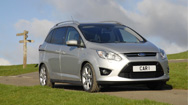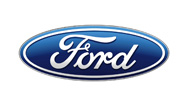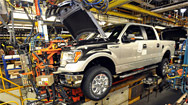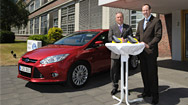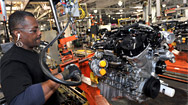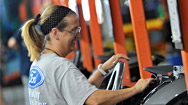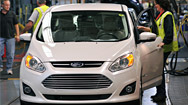Case Study: Saving Lives in Rural India
Henry Ford believed vehicles like his Model T would improve lives through greater mobility. A century later, and half a world away, a young Indian mother named Mageswari and her baby boy are living proof of Mr. Ford’s vision.
Mageswari is one of 41 pregnant women who delivered healthy babies thanks in part to an innovative pilot project Ford Motor Company sponsored in the remote hills of Tamil Nadu, India. The nine-month initiative helped pregnant women overcome geographical and technological barriers that are roadblocks to adequate healthcare.
Called Sustainable Urban Mobility with Uncompromised Rural Reach (SUMURR), the program made use of a Ford Endeavor that was designed to handle difficult terrain and traverse areas previously unreachable by four-wheeled vehicles. Medical professionals traveled in the Endeavor to reach their patients and to transport their patients to clinics. The health care teams also could use their laptops and cell phones to connect – via a wireless connection in the vehicle – to doctors and medical records.
“If not for Ford Endeavor, I might have tried to reach the hospital in a two-wheeler,” said Mageswari, 19. “I do not know what might have happened.”
In the hilly villages of Kallakurichi, maternal and infant mortality is an all-too-common tragedy, with half of all pregnant women and their newborns at high risk of death, disease or disability resulting from inadequate care. Deliveries frequently occur in homes and are rarely attended by trained health professionals. Some of the villages are so remote that government-sponsored nurses have difficulty accessing them. Many pregnant women go for months – if not for their entire pregnancies – without any medical care.
We began the pilot project in June 2012, partnering with the Tamil Nadu Directorate of Public Health, the Indian Institute of Technology Madras (IIT Madras), the U.S. Department of State, George Washington University, and Hand in Hand India, a nonprofit focused on the empowerment of women. Between June and February 2013, the SUMURR program enabled some 1,600 women and children to receive health care, including immunizations and screenings for basic illnesses, at 27 pediatric and gynecology camps set up in remote villages. Many of these locations had never seen physicians before.
SUMURR ultimately reached another 3,100 people as our partners traveled to 54 villages to build community awareness on issues of maternal and child health. Originally, the project partners planned to work in 29 villages. But local nurses in other remote villages saw the benefits and asked to be included, explained K.S. Sudhakar, a project director for Hand in Hand.
Thanks to the success of the pilot, we’re exploring similar programs in other parts of rural India and in other countries, such as China and Brazil, where we have manufacturing operations. Ford invested about $250,000 directly in the project, plus significantly more in terms of the time and expertise of our staff.
“Ford Motor Company is not in the business of telemedicine,” said David Berdish, Ford’s manager of social sustainability and one of the champions of the project. “But between the vehicle and the technology we provide, we can make it better.”
SUMURR showcases how Ford’s OpenXC technology can enhance accessibility in developing economies. In the isolated hills of India, for example, cellular phone signals are extremely weak or nonexistent. By using a technology “cloud” within the Ford vehicle, health care providers could access and store medical information about their patients.
SUMURR isn’t just altruism – there’s a business rationale behind it, too. The SUMURR project offers one model of how Ford can leverage our expertise in fleet vehicles, data and financing to meet social needs and develop new markets.
“SUMURR exemplifies how Ford is using its global reach to address regional issues and causes around the world, and at the same time identify local social and technology entrepreneurs that we can partner with to further develop the kind of solutions that will shape our future,” said K. Venkatesh Prasad, Ford’s senior technical leader for open innovation, who oversaw the SUMURR technology development. “The fundamental aspects of what we did in rural India could very much wind up in the driveways of Detroit.”

